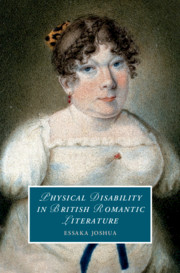Book contents
- Physical Disability in British Romantic Literature
- Cambridge Studies in Romanticism
- Physical Disability in British Romantic Literature
- Copyright page
- Dedication
- Contents
- List of Illustrations
- Acknowledgements
- Introduction
- Part I Politics of Ability
- Chapter 1 William Godwin and Capacity
- Chapter 2 Invigorating Women
- Chapter 3 Wordsworth’s ‘The Discharged Soldier’ and the Question of Desert
- Part II Aesthetics of Deformity
- Conclusion
- Appendix Dictionary Definitions of ‘Disability’ and ‘Deformity’
- Notes
- Bibliography
- Index
- Cambridge Studies in Romanticism
Chapter 1 - William Godwin and Capacity
from Part I - Politics of Ability
Published online by Cambridge University Press: 09 November 2020
- Physical Disability in British Romantic Literature
- Cambridge Studies in Romanticism
- Physical Disability in British Romantic Literature
- Copyright page
- Dedication
- Contents
- List of Illustrations
- Acknowledgements
- Introduction
- Part I Politics of Ability
- Chapter 1 William Godwin and Capacity
- Chapter 2 Invigorating Women
- Chapter 3 Wordsworth’s ‘The Discharged Soldier’ and the Question of Desert
- Part II Aesthetics of Deformity
- Conclusion
- Appendix Dictionary Definitions of ‘Disability’ and ‘Deformity’
- Notes
- Bibliography
- Index
- Cambridge Studies in Romanticism
Summary
The idea of capacity is central to Godwin’s political theory. In spite of his assurance that equality is unrelated to physical or intellectual ability, Godwin makes individual and social liberty contingent upon the types of contributions one’s capacities allow. His political system inevitably produces exceptions (those who do not or cannot contribute to the general good) for which he needs to devise additional measures. People who lack the right kinds of mental and physical capacities prove to be an intractable difficulty. In his fiction, Godwin centralizes the idea that the mind should work in concert with the body, and sees incapacity in either of these as socially and personally problematic. We see this in his repeated use of automata, dolls, and characters who disengage from their bodies in various ways; and in his fictional use of rejuvenation and cure. Godwin speculates that when reason governs society, illness and incapacity will no longer be present. His attitude towards deformity is quite separate from his views on capacity. Deformity, in Godwin’s fiction, is usually a visual sign of an evil character, and he does not articulate the prodigious phase of disability.
Keywords
- Type
- Chapter
- Information
- Physical Disability in British Romantic Literature , pp. 33 - 64Publisher: Cambridge University PressPrint publication year: 2020

